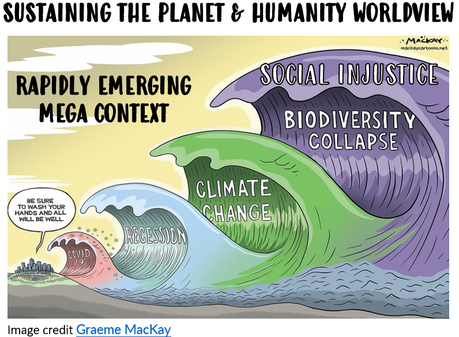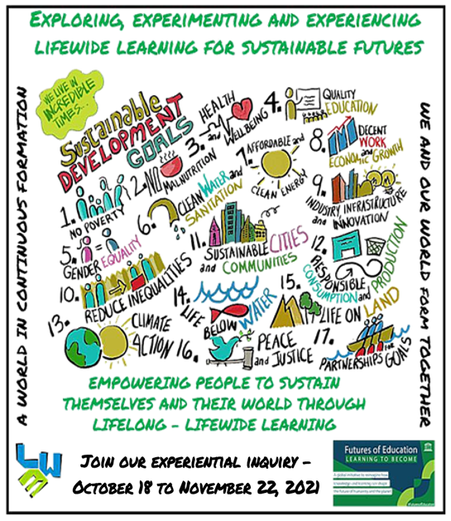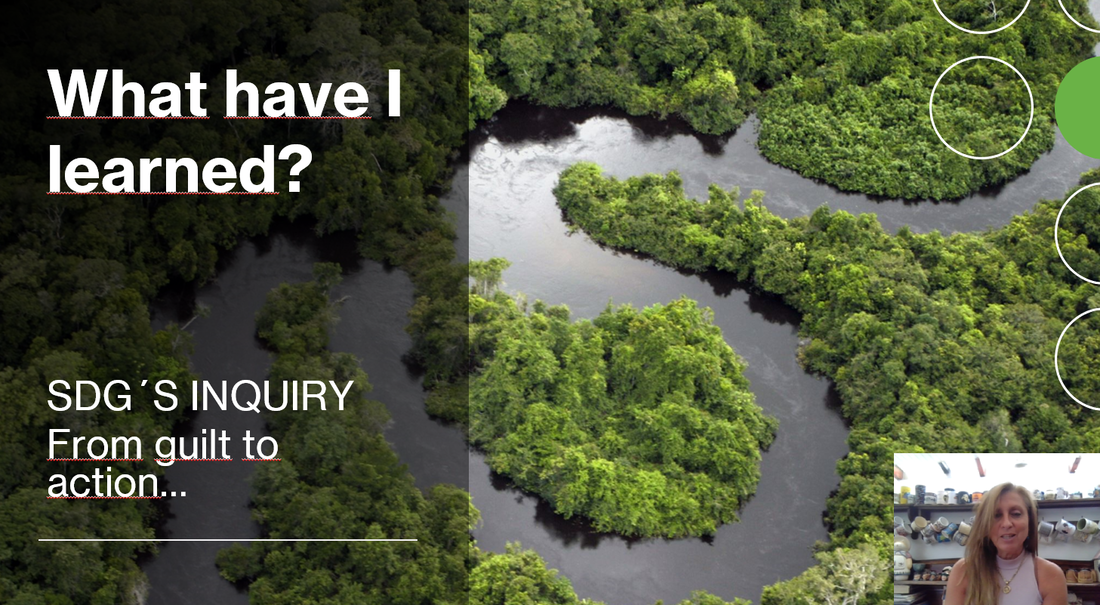Lifewide Learning for Sustainable Futures Inquiry
Working with the SD Goals - One Story at a Time
October 18 to November 22 2021
Working with the SD Goals - One Story at a Time
October 18 to November 22 2021
|
RESOURCES FOR MEETING ON NOVEMBER 22 Norman Jackson' What have we learnt? powerpoint slides
Compilation of 42 Vignettes
VIDEO RECORDINGS OF MEETING PART 1 Norman's summary of what we have learnt Sincere apologies - due to a technical error the discussion part of the meeting was not recorded. KEY DISCUSSION POINTS
INTRODUCTORY MEETING OCT 18
ADDITIONAL INTRODUCTIONS
Holly Warren introduces herself and her work |
Towards a Better Understanding of How We Engage With the Sustainable Development Goals Across the Whole of Our Life Jenny Willis, Norman Jackson & Josefina Ramirez
PART 2 Jenny's summary of Personal SDG statements
Josefina explains what she has learnt through the inquiry through a short powerpoint presentation with a recorded narrative
Catalina tells us what the inquiry meant to her
There is a tendency to feel overwhelmed when we are confronted by the scale of the SDGs but we should approach the task with optimism and celebrate the fact that even small changes can make a positive difference Josefina Ramirez
Although the environments in which we act are different the one universal thing we share is "self". It transcends local/glocal. Eugene Sng A driving force for engaging with the SDGs has to be a concern for future generations Jenny Willis | ||||||||||||||||||||||||||||||

CONTEXT: The contemporary world is complex, hyperconnected, turbulent and increasingly disruptive. It’s a world in rapid and continuous formation and rapid degradation driven to a large extent by human behaviour. It’s also a fragile world that cannot be sustained if we carry on using it in the way we have. The wicked problem of our future survival is framed by the United Nations 2030 Agenda for Sustainable Development, which offers 17 Sustainable Development Goals (SDGs). These goals provide a comprehensive framework to stimulate thinking and actions that are consistent with not only reducing human negative impacts on the world that are detrimental to future sustainability and enhancing impacts that are more likely to secure a sustainable regenerative future, and contribute to a sustainable happiness.

The big question is, “to what extent do we as citizens of the world directly or indirectly engage with these goals in the different parts of our everyday life?” This question is the focus for our inquiry when we will seek to explore lifewide learning in the context of personal actions and experiments that are aimed at creating more sustainable regenerative futures, using the UN SDGs as a framework for thinking and action.
The inquiry will be condicted in the ‘Lifewide Learning Research and Development Group’ discussion space on the Linked In platform. You will need to register on the platform to join the discussion. The LLR&D Group has come together to explore the idea of lifewide learning and education as the foundation for lifelong learning. The group uses a naturalistic, experiential inquiry methodology to explore, apply and develop the concept of lifewide learning to their own lives and circumstances. The inquiry will provide an opportunity for participants to become more familiar with the SDGs and consider their own responses to some of them. It will enable participants to share personal stories, though a short vignette each week. In this way we will learn as a collective and the knowledge we co-create will be curated in an issue of Lifewide Magazine and contribute to the UNESCO Institute for Lifelong Learning, “Futures of Education” initiative. A Background Paper and Inquiry Guide are provided below.
There will be a short Zoom meeting on Monday October 18th (11am BST) to enable participants and facilitators to meet and a link will be provided the day before the meeting. The meeting will be recorded for those who cannot attend.
We embrace diversity of perspectives and we do hope that you will join us.
If you would like to join our inquiry please email [email protected] to let us know.
Warm regards
Norman Jackson, Jenny Willis, Josefina Ramirez and Sam Elkington (facilitators)
The inquiry will be condicted in the ‘Lifewide Learning Research and Development Group’ discussion space on the Linked In platform. You will need to register on the platform to join the discussion. The LLR&D Group has come together to explore the idea of lifewide learning and education as the foundation for lifelong learning. The group uses a naturalistic, experiential inquiry methodology to explore, apply and develop the concept of lifewide learning to their own lives and circumstances. The inquiry will provide an opportunity for participants to become more familiar with the SDGs and consider their own responses to some of them. It will enable participants to share personal stories, though a short vignette each week. In this way we will learn as a collective and the knowledge we co-create will be curated in an issue of Lifewide Magazine and contribute to the UNESCO Institute for Lifelong Learning, “Futures of Education” initiative. A Background Paper and Inquiry Guide are provided below.
There will be a short Zoom meeting on Monday October 18th (11am BST) to enable participants and facilitators to meet and a link will be provided the day before the meeting. The meeting will be recorded for those who cannot attend.
We embrace diversity of perspectives and we do hope that you will join us.
If you would like to join our inquiry please email [email protected] to let us know.
Warm regards
Norman Jackson, Jenny Willis, Josefina Ramirez and Sam Elkington (facilitators)
|
BACKGROUND PAPER
|
INQUIRY GUIDE
|
|
| ||||||||||||
Eco-philosophy for an ecological world
Thomas Berry was an eco-theologian. His vision and philophical wisdom, encoded in 12 principles, is important and relevant to the transition we need to make to ways of thinking about our existence and our role on planet earth.
Thomas Berry was an eco-theologian. His vision and philophical wisdom, encoded in 12 principles, is important and relevant to the transition we need to make to ways of thinking about our existence and our role on planet earth.
Twelve Principles for Understanding the Universe and the Role of the Human in the Universe Process by Thomas Berry
1. The universe, the solar system, and the planet Earth, in themselves and in their evolutionary emergence, constitute for the human community the primary revelation of that ultimate mystery whence all things emerge into being.
2. The universe is a unity, an interacting and genetically-related community of beings bound together in an inseparable relationship in space and time. The unity of planet Earth is especially clear: each being of the planet is profoundly implicated in the existence and functioning of every other being.
3. From its beginning, the universe is a psychic as well as a physical reality.
4. The three basic laws of the universe at all levels of reality are differentiation, subjectivity, and communion.
5. The human is that being in whom the universe attains reflexive consciousness of itself.
6. The Earth, within the solar system, is a self-emergent, self-nourishing, self-educating, self-governing, selfhealing, self-fulfilling community. All particular life-systems in their being, their nourishment, their education, their governing, their healing, their fulfillment must integrate their functioning within this larger complex of mutually dependent Earth systems.
7. The genetic coding process is the process through which the world of living evolves, educates, and rules itself. The great wonder is the creative interaction of the multiple codings among themselves.
8. At the human level, genetic coding mandates a further trans-genetic cultural coding by which specifically human qualities find expression. Cultural coding is carried on by educational processes.
9. The emergent process of the universe is irreversible and non-repeatable in the existing world order. The movement from non-life to life on the planet Earth is a one-time event. So, too, the movement from life to the human form of consciousness. The movement from the simpler to more complex cultural forms is also, most likely, irreversible on the larger time scale.
10. The historical sequence of cultural periods can be identified as the tribal-shamanic period, the classical civilizational period of the great religious cultures, the scientific-technological period, and the ecological period.
11. The main human task of the immediate future is to assist in activating the intercommunion of all the living and non-living components of the Earth community in what can be considered the emerging ecological period of Earth development.
12. Functionally, the great art of achieving this historical goal is the art of intimacy and distance, the capacity of being to be totally present to each other while further affirming and enhancing the differences and identities of each.
1. The universe, the solar system, and the planet Earth, in themselves and in their evolutionary emergence, constitute for the human community the primary revelation of that ultimate mystery whence all things emerge into being.
2. The universe is a unity, an interacting and genetically-related community of beings bound together in an inseparable relationship in space and time. The unity of planet Earth is especially clear: each being of the planet is profoundly implicated in the existence and functioning of every other being.
3. From its beginning, the universe is a psychic as well as a physical reality.
4. The three basic laws of the universe at all levels of reality are differentiation, subjectivity, and communion.
5. The human is that being in whom the universe attains reflexive consciousness of itself.
6. The Earth, within the solar system, is a self-emergent, self-nourishing, self-educating, self-governing, selfhealing, self-fulfilling community. All particular life-systems in their being, their nourishment, their education, their governing, their healing, their fulfillment must integrate their functioning within this larger complex of mutually dependent Earth systems.
7. The genetic coding process is the process through which the world of living evolves, educates, and rules itself. The great wonder is the creative interaction of the multiple codings among themselves.
8. At the human level, genetic coding mandates a further trans-genetic cultural coding by which specifically human qualities find expression. Cultural coding is carried on by educational processes.
9. The emergent process of the universe is irreversible and non-repeatable in the existing world order. The movement from non-life to life on the planet Earth is a one-time event. So, too, the movement from life to the human form of consciousness. The movement from the simpler to more complex cultural forms is also, most likely, irreversible on the larger time scale.
10. The historical sequence of cultural periods can be identified as the tribal-shamanic period, the classical civilizational period of the great religious cultures, the scientific-technological period, and the ecological period.
11. The main human task of the immediate future is to assist in activating the intercommunion of all the living and non-living components of the Earth community in what can be considered the emerging ecological period of Earth development.
12. Functionally, the great art of achieving this historical goal is the art of intimacy and distance, the capacity of being to be totally present to each other while further affirming and enhancing the differences and identities of each.

